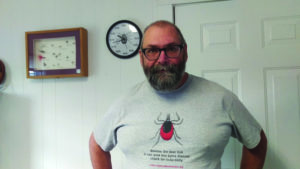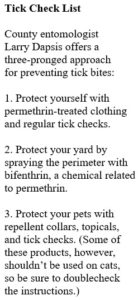TRURO — Early in his career as an entomologist with the Cape Cod Cooperative Extension, Larry Dapsis received a “dad talk” from Bill Clark, his director. Clark peered over his glasses, Dapsis recalled, and said flatly, “You can’t get Lyme disease. If you do, people will lose confidence in you.”

Dapsis joined the extension service in 2011. He is Cape Cod Extension’s deer tick program coordinator. And he insists he never gets tick bites, a bragging right he earned by treating his clothes with permethrin. His ritual is a year-round one. He sprays his pants, from bottom hem to mid-thigh, letting the chemical sit for an hour. The same goes for his socks.
His shoes also get a generous spritz — a “mission-critical step,” he says, for shutting down nymph stage ticks, which flourish in the summer, crawling out from their winter hiding places in leaf litter and going into “questing” mode in search of a host. Nymph stage ticks are responsible for 85 percent of all tick-borne diseases. Roughly the size of a poppy seed, the nymphs latch onto footwear first, but Dapsis found in his research that if they occupy a permethrin-treated surface for 60 seconds, their death is guaranteed.
On clothing, the chemical’s effectiveness holds through six washes or 45 days — whichever comes first. As for shoes, Dapsis recommends treating them every four weeks.
“This is the most effective tool in the box to prevent tick bites,” he said in “Tickology,” a video series put out by the Extension in 2018. “Hands down. You do this, and you’re reducing your risk of exposure of tick bites by upwards of 90 percent.”
In concert with his outreach and education efforts, Dapsis waged a campaign with local garden stores on the Cape, urging them to stock up on permethrin. The product was a smash hit. “One of the garden centers told me they’re out of stock more than in stock,” Dapsis says. “Some customers were going just to get permethrin instead of anything else.
“I kept kidding to my current director at the Cooperative Extension that we should be getting a cut of those permethrin sales,” he adds. “I drove so much traffic into those stores.”
 Pitching permethrin to the community, however, involved years of persuading and myth-busting for folks leery of chemicals. Time and again, Dapsis has faced questions about permethrin’s toxicity and the risks of exposure to it.
Pitching permethrin to the community, however, involved years of persuading and myth-busting for folks leery of chemicals. Time and again, Dapsis has faced questions about permethrin’s toxicity and the risks of exposure to it.
The Environmental Protection Agency, he tells people, has determined that the chemical, when applied at recommended levels, poses no harm to infants, children, pregnant women, or nursing mothers. And in the long term, adverse health effects are unlikely, according to a 1994 study by the National Research Council, which monitored the well-being of soldiers who wore permethrin-treated clothing 18 hours a day, seven days a week, for up to 10 years.
Before coming to the Cape, Dapsis spent 24 years with Ocean Spray Cranberries Inc. Growers in Washington and Oregon were on the brink of losing their cranberry farms to black vine weevils that devastated roots, and Dapsis helped develop a nonpesticidal method of controlling them. His approach centered on applying parasitic nematodes, which are microscopic worms, to the soil.
“Then my career trajectory made a hard left turn into public health,” he says. “I never dreamed how extensive a problem ticks were. And so, I became almost an evangelist with the video series and workshops.”
As tick population numbers on the Cape have soared, the region has come to be known as “ground zero for Lyme disease,” Dapsis says. The bugs have boomed, he explains, owing to the fragmentation of forests from human development, which, in turn, reduces biodiversity, driving down the number of top-tier predators, such as foxes. This allows the numbers of small rodents like mice and chipmunks to climb. An increase in the population of these critters means more vessels for ticks and their associated illnesses.
Climate change, Dapsis adds, has also expanded the range of various species of ticks. Along with Lyme disease, ticks can carry four other illnesses: babesiosis, anaplasmosis, relapsing fever, and Powassan virus.
“My job is to scare the crap out of you to get your attention,” he says, “and then slowly reel you into the simple things we can do to prevent these things.”



